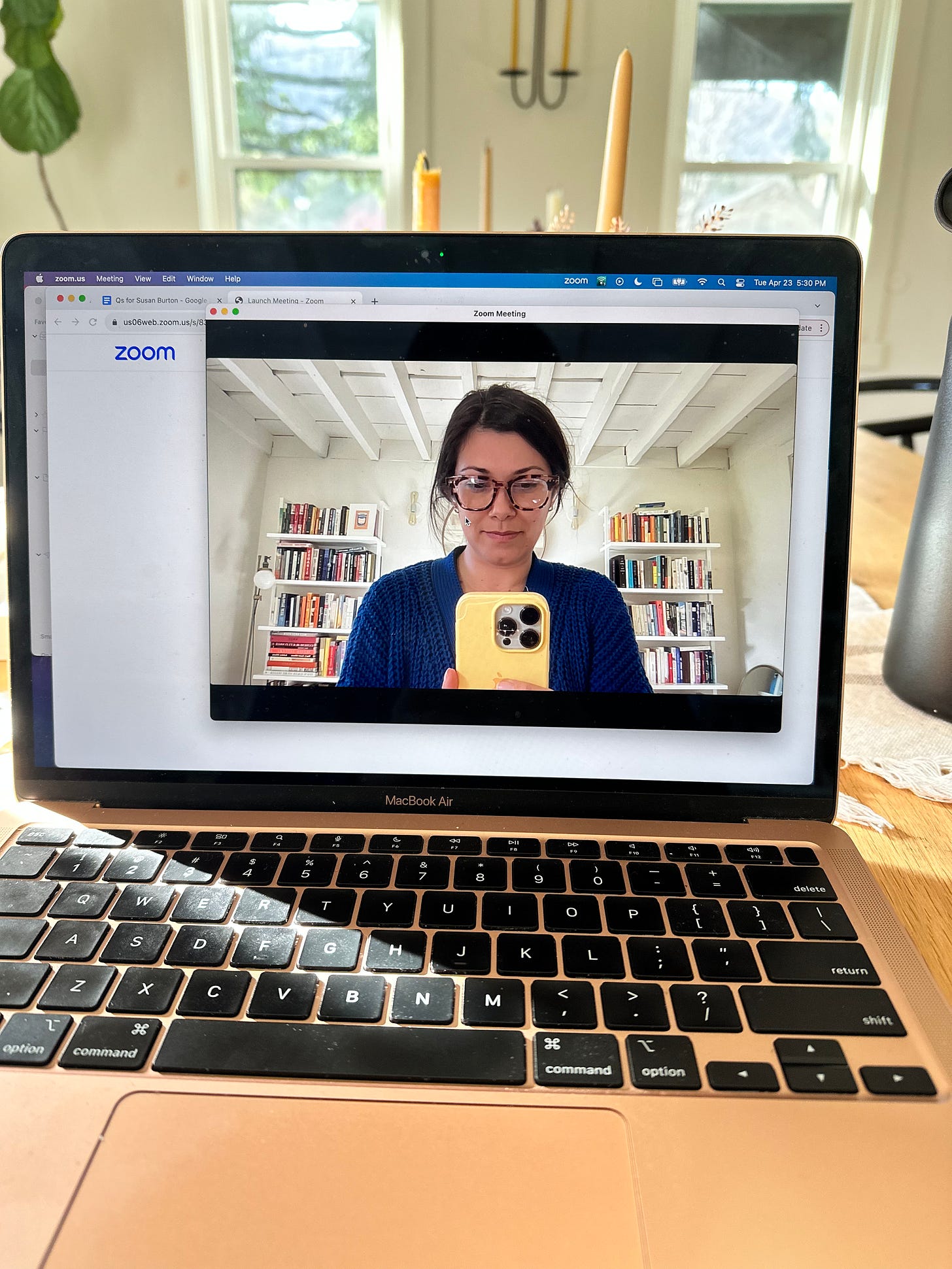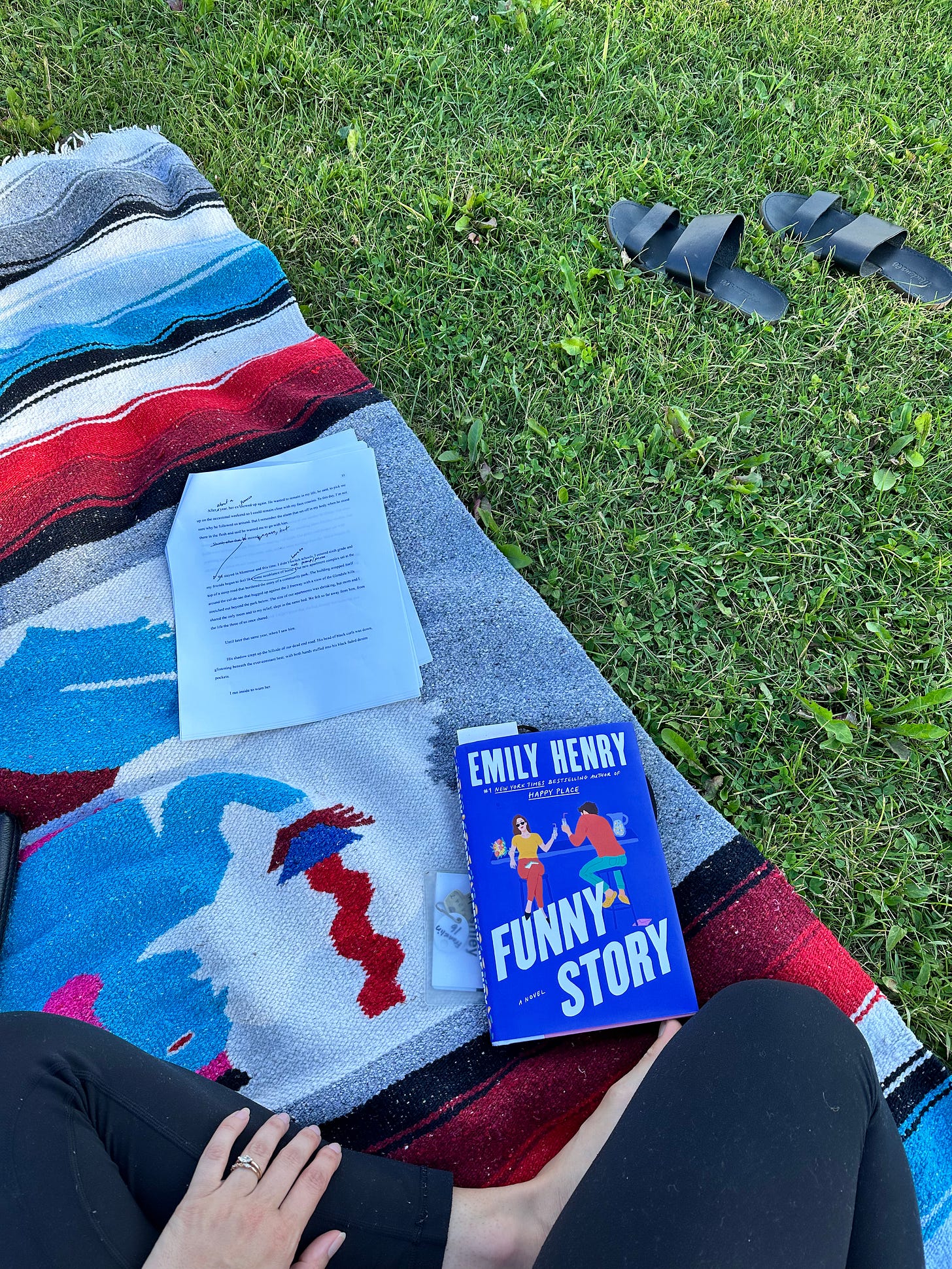I am sitting in a tufted corner booth, the lights dim enough to give the tea candle on the table its purpose. My friend and I are splitting a three course meal. This is a book club.
We scour the menu as we ask ourselves, which dish are we least likely to make ourselves at home? Once decisions have been made and menus get handed back as drinks arrive, we pull out the short stack of books we came to discuss. My friend grabs a novel at random and flips through its pages, though she always ends up going straight to the back.
“How did this one end?” she asks.
The truth is, I hardly ever remember.
*
I had the immense privilege of speaking with Susan Burton recently in this interview for Narratively x CNF’s Art of Storytelling series. Our entire conversation was about endings. Because the way she ended her podcast The Retrievals blew me away. It was riddled with questions, complexity and emotion. I felt a lot of things when I was done listening to the podcast, but what I did not feel was resolution.
As Burton notes in our talk, nothing in life can be tied up neatly, so why do we expect that? Why did I think a story as complex as The Retrievals, about the neglect of women’s pain, should offer any resolve? And why have I been writing my own personal essay about my postpartum pain and neglect to have a “happy” ending?
As I type that question out, my memory hands me a flashback: When my husband’s parents came to visit us after the horrifying, traumatic birth experience we had in the hospital, his mom said something to the degree of, But you have a healthy baby, what more could you ask for?
And that’s the thing. I’m not supposed to ask for much because I’m a woman-mother. Yet, by definition, I have to ask for so much more for that exact same reason.
Before I spoke with Burton for the first time, I read her memoir, Empty, about her lifelong struggle with eating disorders. Her book is one of few that has an ending I clearly recall—like her podcast, it couldn’t offer resolution. The thing about eating disorders, Burton calls out, as opposed to other substance addictions, is that the protagonist still needs to eat. You can’t just take food out of your life, so the relationship is a constant work-in-progress. Similarly, I now realize, so is pain.
It’s interesting to think about pain and beginnings and endings, Burton noted to me over Zoom. If you stop to think about that, it really is. In medical settings, professionals try with all their might to measure what is seemingly immeasurable. That’s sort of how we got into the whole opioid epidemic, isn’t it? Pain is this thing that medically, our country’s healthcare system seeks to control. Why? Why don’t we leave any room for pain to be viewed as good, as informative? Isn’t pain a way for us to be in conversation with our bodies? To signal where to direct our attention?
Once, my infant had a high fever and I called our pediatrician. At what point do I need to rush him into the ER? I asked. A high fever is a good thing, he told me. It means the body is fighting back against the infection. If he isn’t urinating or taking down fluids, that’s when you go to the hospital—to avoid dehydration. He freed me of so much unnecessary worry.
I’ve recently had a lot of doctor visits in regard to my paralyzing anxiety. When I told my physician it’s not stress related, that it’s not a mental load that triggers the anxiety but a physical response in my chest that causes the panic, her worksheet questions became irrelevant. We can’t really measure this kind of stuff, my physician explained, all we can do is try.
When the lawyers told me I didn’t have a case against the hospital that damaged one of my organs due to neglect during my c-section recovery because there was no proof of damage, I was furious. That fury may not always be active. These days, it lives dormant as I survive through my sons’ early childhood years. But the fury is still there. It resurfaces when I have physical medical issues, yes, but mostly it’s the emotional triggers that let it loose. It’s when I don’t feel listened to. When doctors can’t admit what they don’t know. When my efforts to collaborate are rejected or viewed as non-compliant.
It is an emotional pain that has no end.
*
In a recent lecture with Marie-Helene Bertino, she discussed how difficult it was to begin a story in the middle of a dramatic event and then use the rest of the narrative to explain how we got there. Sadly, she was (implicitly) talking about me. About this essay I’ve been trying to nail down for years and have never found the right ending for. I was so committed to the beginning that I couldn’t figure out the right ending, or timeline for that matter. To offer more emotional resonance, Bertino suggested, you should first try writing it linearly. This allows the reader to follow along in the experience as if it’s unfolding for them in real time, and they become much more invested in the character(s) that way.
Of course, this advice worked wonders for my essay-in-progress. It also fucked me up a little. Because I want to work with time like it’s this rubber band. I want to stretch it and snap it and experiment with it in the art of writing. I want to showcase how every experience I have now, on the other side of becoming a mother, is beginning to feel like one sliver of color on a rubber band ball. A more honest keepsake than any photo album could ever be.
Off the page, every “end” I’ve encountered in my life has inherently been a beginning. In stories and books, I think a good ending is less about resolution, conclusion, or a happily ever after—it’s much simpler than that. It’s a feeling, in all of its complexity. There is no formula for nonfiction writing. Only our attempt at truth. By that I mean, what is simple is complex. What is a memory is often imagined. What is an end is also a beginning.
*
At my most recent MFA residency, I was walking between lectures with a friend that said she wanted to write about her friend’s husband passing away. But she didn’t know how to start it, or what it was she even wanted to say, only that it was something she felt she wanted to explore on the page.
Start at the end, I said. Start with his death and work your way backwards. See where the story takes you.
books
For this month’s story recommendations, I asked a few of my writer-peers to tell me about their favorite story endings and why. Some are films, some are books. I’d love to hear your favorite endings in the comments below.
James Joyce’s The Dead (Lee Holden)
“It’s this really long thing and it takes forever to get to it. But if you put up with it, you get to this moment when the main character is thinking about his life. He looks out the window and sees the snow falling. It zooms out to the snow falling all across Ireland and he’s having this moment of being outside of himself, which I think is really beautiful.”
The Florida Project (Emily Berge-Theilman)
“It’s a story about a girl who lives in a shitty hotel just outside of Disney World and in the end she’s going to be taken away from her mom by Child Protective Services. And they enter a differently stylized sequence that was shot entirely on the filmmaker’s iPhone because you can’t film in Disney World so they did it entirely without permission. [You see] the kid running out of the hotel and into Disney World, toward the castle. It’s super fantastical and very clearly not what’s happening in reality. It’s also the time I’ve seen my partner cry the hardest.”
The Princess Bride (Lucy Murtell)
“The ending is an image of enduring love. It’s so beautiful. I love the three white horses and her jumping out of the window, and I love Princess Buttercup. My parents loved that movie and it reminds me of their love.”
All Of Us Strangers (Jefferey Spivell)
“The whole movie plays with surrealism and fantasy and the core plot is: the character is a gay man. He’s writing a screenplay about his parents and goes back to his childhood home and they’re there. They died when he was young and they’re in the house when he goes and he talks to them and keeps going back to visit them. The whole movie you don’t really know what is real and what is not. There’s a twist at the end that you don’t see coming until the last ten minutes and it really wallops you.”
John Steinbeck’s The Grapes of Wrath (Ali Meyers-Ohki)
“They’ve gone through so much and they’re so hungry and they find this dying man in a barn. And this character, Rose of Sharon, has had a pregnancy that was terminated unwillfully, and she ends up nursing the old man in the barn because he’s starving. I remember reading it as a teen and thinking it was really beautiful and then going to class and everyone was like ew that’s gross. I was really shocked but it was a moment for me of really seeing what books could do.”
Paul Murray’s The Bee Sting (Jill Witty)
“The way the crises and conflict mount, the way he dials the tension up so high that you’re sure the valve will burst, is masterful. You can’t put the book down as it races toward what feels like is inevitable disaster.”
Lois Lowry’s The Giver (Casey Scieszka)
“Without giving the whole thing away, I’ll just say that it does that thing where in the end it actually opens up a whole new world. I felt both satisfied *and* filled with ten thousand more questions.”
Also, You Dreamed Of Empires by Álvaro Enrigue is the best ending I’ve read in a novel in the last few years by one hundred miles! The moment I finished I reread the last two chapters so I could luxuriate in their brilliance again.”
beauty
This month’s beauty recs are about efforts towards putting an end to toxic, harmful products we lather onto our bodies.
To start— the entire SISTERS line. Formulated by three sisters in Brooklyn, their shampoo and conditioner smell so yummy and stretches out the time between washes. Their ingredients are nontoxic and nearly half of their profits go to funding organizations in support of women’s health.
And, the soaps my dear friends started making. TUETAL was created out of the inspiration and ingredients they’ve sourced from their surroundings up here in the Catskills. Their soaps use ethically harvested essential oils that infuse both a lovely scent and energy. I’m convinced every bar has its own infectious magic within.
x






